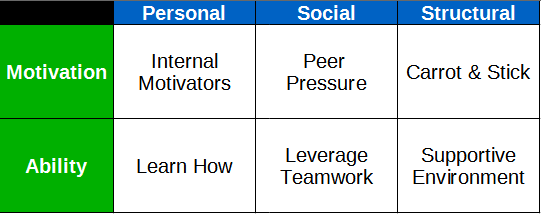Search the Community
Showing results for 'Weight gain'.
Found 17,501 results
-
On the face of it, losing weight seems so simple. How many times have we all heard statements like “just eat less and move more!” While that type of sentiment is factually true, it can be incredibly hard in practice. The reason is because we all are creatures of habit.
Now when I say habit, I don’t want you to think of the negative connotation we sometimes give to the word habit. Habits can be and often are, good things. An example would be brushing your teeth before bed. If that’s a habit you have (may of us do), it would be hard to classify that as a bad thing. We do it partly because we know we should, but also because it’s just become a habit, and things would feel off if we didn’t do it. In fact, because so much of what we do on a day-to-day basis is routine, habits help us get those things done without having to exert much extra mental energy to them.
It follows that if we want weight loss or other healthy behaviors to become habit, we have to “hack” our brains a little. We do that by replacing old behaviors with new behaviors. Over time, the new behavior become a habit that replaces the old behavior we want to get rid of.
This again sound simple enough, but because we as humans are wired to seek out rewards, we sometimes do things we know we shouldn’t. This means we can’t just flip a switch and start working out, or ”eating better” (whatever that means). We first have to make sure the reward we get for the current behavior is minimized, and the reward we get for the new behavior is maximized. By doing that, we can slowly change behavior.
To make this easier, I have grouped behavior change into six dimensions we need to focus on:

We’ll start with the 3 dimensions of motivation. Motivation is often misunderstood, so I want you to think about it a little differently than you may think of it now. Motivation is simply the mental processes that drive your behavior. Thus when someone says “I have no motivation”, that’s actually incorrect. They do have motivation, they just have motivation to do something else.
Personal Motivation – These are things that internally motivate you as an individual person to act in a particular way. There are several factors that make up personal motivation, but the most important factor is how a new behavior makes you feel vs. the current behavior. To change behavior, we need to minimize the negatives associated with the new, desired behavior and maximize the positive aspects of it. We also want to do the exact opposite for the bad behavior we want to replace.
For a more personal example, I like fishing but am not a big fan of slow cardio (too boring to me). I can turn boring exercise into playing simply by using a row boat or kayak to fish from, rather than a motorized boat. If you have small children, you could play tag or hide and go seek with them, rather than walking on a treadmill.
Social Motivation – This form of motivation is all based on the fact that at our core, people are social animals. In short, we crave acceptance by others. While this can be a negative if taken to the extreme, we can also make it work to our benefit. Examples would be having one or more accountability partners or using social pressure to ensure compliance.
Structural Motivation – Also known as the “carrot & stick”. The goal is to find ways to add in additional punishments for bad behavior and rewards for good behavior. For example, many people find that meaningful financial rewards or punishments can drastically impact behavior. An example might be “placing a bet” with a family member that you will not eat any highly processed foods for the next month. If you succeed, you get the payout, but if you fail, you have to pay instead. Obviously the carrots & sticks don’t have to be financial at all, but for many people money is a big motivator.
We move now from Motivation to Ability.
I want you to think of ability as how prepared you are to replace bad behaviors with good ones. It does us no good to be super motivated to take on a new good habit if we don’t have the knowledge, skills, or ability to actually incorporate the that habit into our lives.
Personal Ability – This is all about learning and developing the skills, tools & knowledge you’ll need to actively engage in the new behavior. For example, if my goal was to use horseback riding as exercise, I’d have to get a horse, find a place to board the horse, learn to ride, learn to care for the horse, etc. before that could become a reality. This is obviously an extreme case, but too many times we expect that simply having motivation will be sufficient to reach a goal. The fact is it’s not. No matter what the goal is, there is some level of knowledge or skill needed to make it happen. A more concrete example might be “wanting to eat more vegetables”. For many people, this is a challenge not because they don’t like vegetables, but because they have no idea how to prepare them. Learning to do so would be the TRUE first step to a better diet.
Social Ability – Teamwork is the operative word here. Perhaps you really struggle to walk enough on a daily basis, but you also know if you have someone to walk with you, it would make it much more enjoyable for you. This can also refer to using a coach or expert to help. If you know you need to use strength training to reach your goals, but don’t have any idea where to start. Enlisting the help of a professional might be just the thing you need.
Structural Ability – I like to think of this one as cheating to your advantage! So many times, we create environments where we’re almost bound to fail. Examples are things like keeping a bag of chocolate or saving your “fat clothes” just in case. Another classic example would be failing to plan meals ahead of time. Instead, we need to change everything we can about our environment to support us making good choices and eliminating anything that causes us to stumble.
Taken together, these six sources of habit change can help you replace bad habits with good ones, but it’s not magic. You still have to work at it and you still have to make yourself more aware of when and why you are choosing bad habits over good ones. This awareness is really the first step to success.

















.thumb.jpg.db4b34feb108f29e7b236cddeeadd8a2.jpg)


